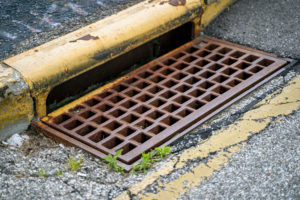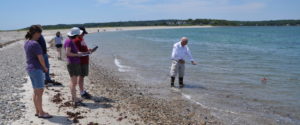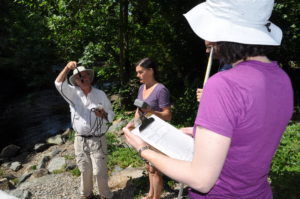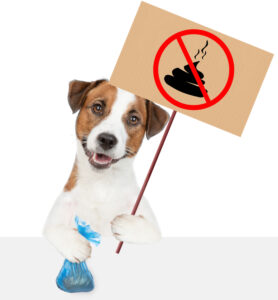 The Pet Waste Problem on the South Shore
The Pet Waste Problem on the South Shore
On the South Shore alone, we have more than 16,000 registered dogs from Weymouth to Kingston. According to the Environmental Protection Agency (EPA), the average dog produces approximately ¾ pound of waste per day. If you do the math, that’s more than 12,000 pounds of poop per day and 4.5 million pounds of poop per year – just on the South Shore.
To help educate the public and combat this problem, the North and South Rivers Watershed Association, in partnership with 12 WaterSmart towns on the South Shore, is currently distributing pet waste education cards to town clerk offices (where people get their dog licenses), pet stores and veterinary clinics. The Scoop the Poop! Card is a part of the WaterSmart program, and was created by the Greenscapes Coalition. The card educates residents on the importance of picking up after their pets.
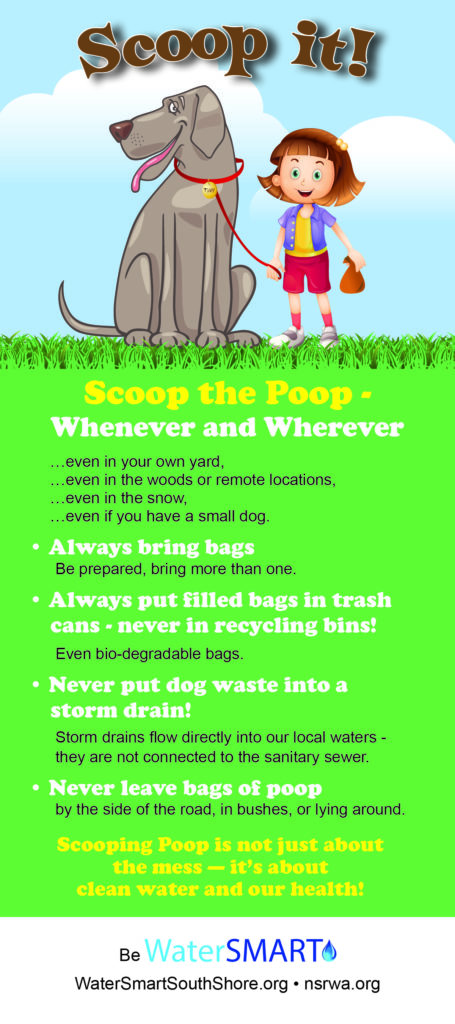 Why is Dog Poop Such a Problem?
Why is Dog Poop Such a Problem?
Scooping the poop is not just about the mess – it’s about clean water and the health of our community:
- Leaving behind pet waste is unhealthy for people, other animals and the environment. It is a breeding ground for infection. It is raw sewage with twice as much bacteria as human waste.
- A 40-pound dog produces 7.8 billion fecal coliform bacteria per day.
- Pet waste left on the side of the road or in the woods releases bacteria that can end up in our water supply where humans and other animals can be exposed.
- Giardia, Salmonella, and Campylobacter are just some of the diseases that can be transferred to humans from pet waste.
- The US Center for Disease Control and Prevention (CDC) has also confirmed that pet waste can spread parasites including salmonella, tapeworms, roundworms and hookworms.
One of the largest pet waste issues is improper disposal. A common misconception is that it is a natural fertilizer and can simply be collected into the garden or flower bed. This is not true. In fact, leaving pet waste on the ground or concentrating it in one specific area of the yard can seriously harm soil quality and can be dangerous for both families and their pets. Cows and horses are herbivores, which makes their waste ideal for use as fertilizer, but dogs and cats are carnivores, making their waste unsuitable for soil enrichment. But that’s not all, in developed areas, waste deposits left on the ground can also serve as a steady, abundant food source for rats and mice.
South Shore Public Works departments often discover dumped dog-waste bags when they clean out our storm sewers. This is a huge problem because storm sewers are not connected to wastewater treatment plants or septic systems like the drains in your home. When pet waste is tossed into a storm drain or left on the sidewalk, street or yard, it is carried by rainwater through the storm sewer system directly into our local streams and rivers without any treatment. This means that the dog poop that washes into our storm sewers flows directly to nearby creeks, fish and wildlife habitats, downstream recreational areas, and into our drinking water supplies.
How Can You Help?
Join thousands of other responsible South Shore dog owners and Scoop the Poop –whenever and wherever–even in your own yard, in the woods and at the beach, even in the snow and even if you have a small dog.
- Always bring dog-waste bags and put filled bags in a trash can.
- Never put dog waste in a recycling bin.
- Never use dog poop was a “natural” fertilizer in your yard or garden–it can be toxic to your soil and your family.
- Never leave dog-waste bags on the roadside or dump them in storm drains–these are not connected to wastewater treatment facilities or septic systems.
- Pick up a Scoop It! pet waste information card at your town clerk’s office (where you get your dog license) or download it online.
Scooping poop is not just about the mess – it’s about clean water and our health. So help us spread the word, the message is clear: Scoop the Poop! You can make a difference by being a responsible pet owner.
WaterSmart is a nonprofit partnership between the NSRWA and 12 towns on the South Shore: Cohasset, Duxbury, Hanover, Hingham, Hull, Kingston, Marshfield, Norwell, Pembroke, Rockland, Scituate and Weymouth. Our programs are based on the belief that education is key. Since its creation, WaterSmart has educated thousands of local school-age children, adults, and businesses on water conservation, stormwater pollution, where their water comes from, and how to care for it.

- Dumpster Maintenance and Waste Materials
- Gardening Green Expo 2025
- Greenscapes
- How to Build a Rain Garden
- Indoor Water Conservation
- Low Impact Development
- Parking Lot Maintenance
- Pet Waste Education
- Plant a Monarch Garden
- Rain Barrel and Composter Sale
- School Programs
- Septic Systems
- Sign Our Water For People Not Lawns Pledge
- Stormwater
- Water Conservation Tips
- Watersmart Business


